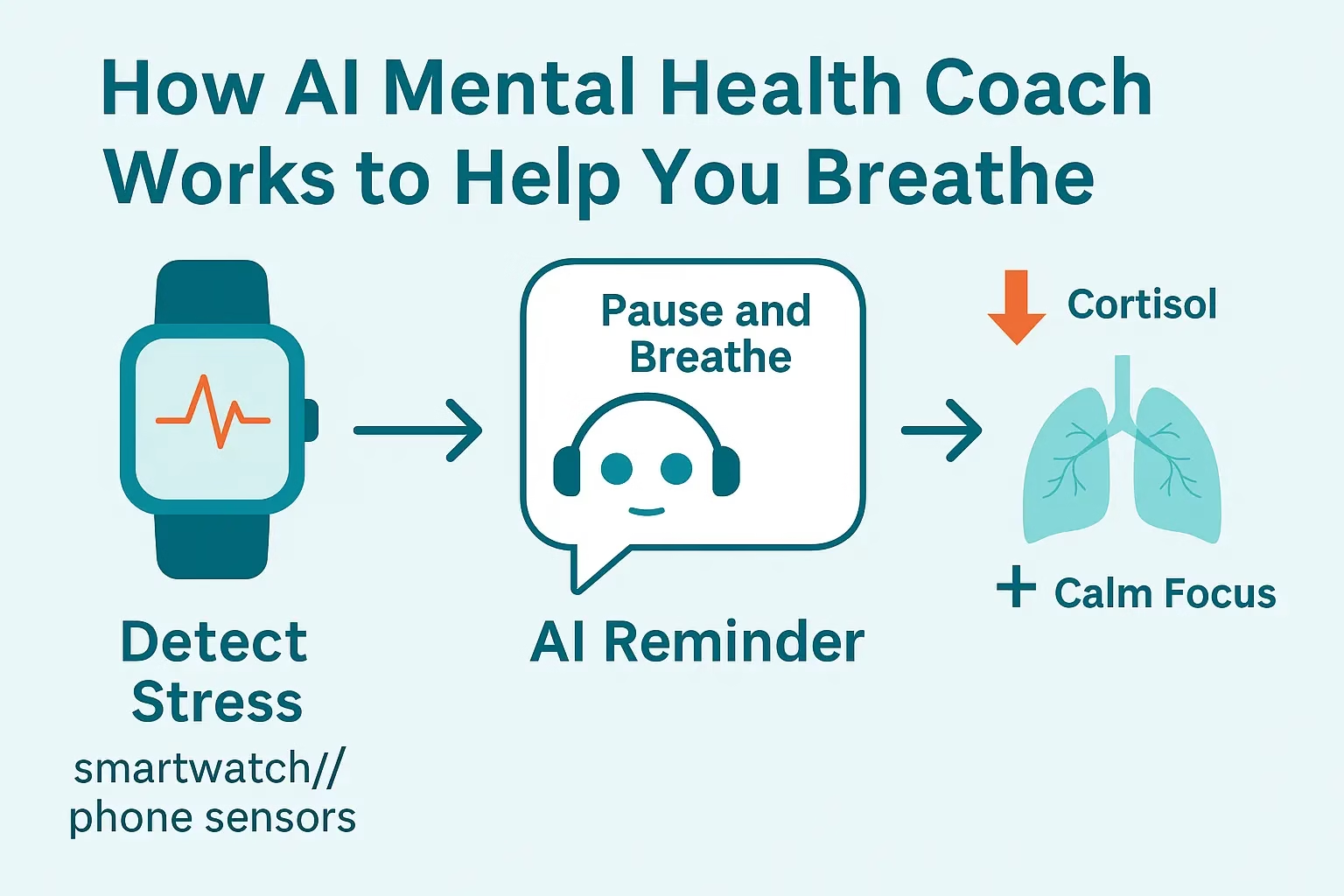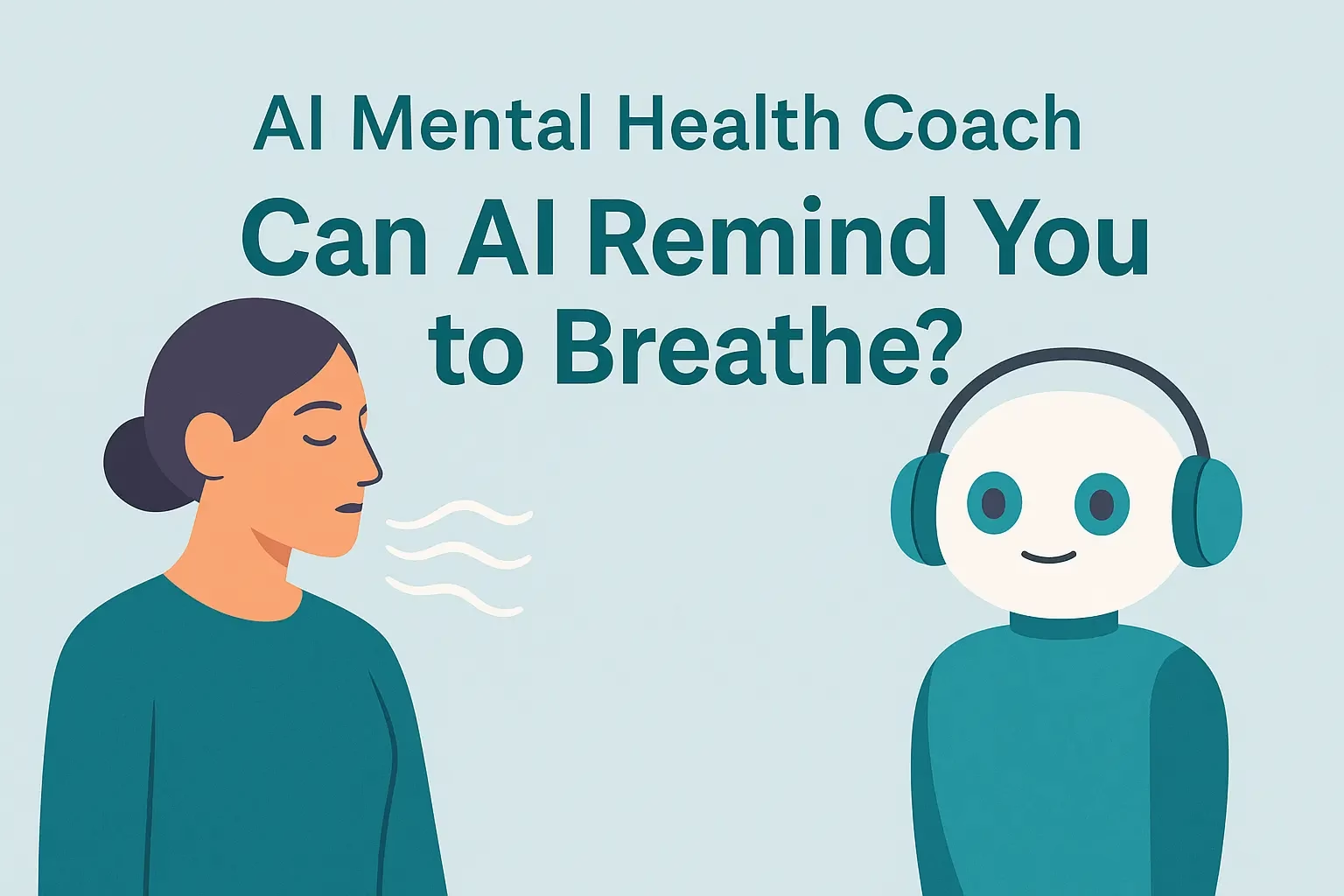AI Mental Health Coach: 7 Powerful Ways AI Can Remind You to Breathe
Introduction: The Rise of AI in Mental Health The digital environment of today creates an environment which continuously stimulates our minds. People spend most…
Table of Contents
Introduction: The Rise of AI in Mental Health
The digital environment of today creates an environment which continuously stimulates our minds. People spend most of their time dealing with work alerts and scrolling through their phones while managing their tight schedules so they rarely find time to take deep breaths. An AI mental health coach would function as a stress detector which alerts you to pause and practice deep breathing exercises.
This isn’t science fiction anymore. Artificial intelligence systems operate in the background to develop innovative methods for delivering mental health care. AI technology enables millions of users to achieve emotional regulation through evidence-based nudges which appear in smartwatches and chatbots to help them control anxiety and stay calm throughout their day.
How AI Reminders Help You Breathe Through Stress

“How AI detects stress and reminds you to breathe, leading to calmer focus.”
The fast-paced world now has instant companions through artificial intelligence technology-based mental health applications which offer more than mood tracking capabilities. The AI reminder to breathe functions as a fundamental yet highly useful capability.
AI systems use phone and smartwatch data to detect stress patterns which trigger soft alerts that help users stop and practice deep breathing exercises for relaxation. The small adjustments help you manage your nervous system and decrease cortisol levels which results in peaceful focus during your regular activities.
Just like a Digital Dopamine Detox helps you reset constant phone triggers, AI reminders create mindful pauses to breathe.
Source: Systematic Review on Coaching in Digital Health Interventions (2025) and AI wellness research trends from APA PsycINFO and Medline.
AI Mental Health Coach Trends in 2025
The 2025 AI wellness research shows that artificial intelligence technology is quickly changing how digital mental health care operates. According to APA PsycINFO and Medline, there has been an estimated 40% increase in AI-powered emotional support platforms and stress detection systems in just one year.
The system now operates through AI-based preventive digital mental health which detects emotional changes before users become aware of them instead of using traditional reactive therapy methods that respond after anxiety occurs.
AI systems provide instant prompts through typing speed and breathing patterns and facial micro-expressions which state “Pause for a breath” and “Reflect on how you feel right now.”
The development of emotionally intelligent technology has started a new period according to AI system developers who create technology which monitors mental states and delivers instant emotional strength training.
Source: Based on APA PsycINFO and Medline reports on 2025 AI wellness research trends.
Can AI Chatbots Truly Support Your Mental Health?
Research shows that AI chatbots now go beyond answering questions because they can both listen to users and offer comfort and immediate motivational support.
The AI systems of Woebot and Kaiser Permanente employ emotion recognition and behavioral data to help users manage stress and loneliness and anxiety. These bots enable people who lack quick access to therapists to receive mental health assistance.
Still, researchers emphasize that while AI can act as a supportive companion, it should never replace genuine human connection or licensed care.
Source: Adapted from Paul E. Terry (2025), “Should My Chatbot Health Coach Be Certified and Regulated?” American Journal of Health Promotion, Vol. 39, No. 5, pp. 724–727.
When AI Feels Almost Human
A fascinating new study from the International Journal of Human–Computer Interaction (2025) found that licensed therapists often couldn’t tell the difference between therapy conversations held with a human versus an AI chatbot.
Professionals guessed correctly only 53.9% of the time — about the same as random chance. Even more surprising, many rated the AI sessions as slightly better in listening and empathy.
These findings suggest that AI is learning to mimic the warmth, tone, and curiosity of real therapists, especially in the early stages of a conversation where active listening and emotional validation matter most.
Source: Mohammad Amin Kuhail et al. (2025), “Human–Human vs Human–AI Therapy: An Empirical Study,” International Journal of Human–Computer Interaction, Vol. 41 (11), pp. 6841–6852.
Review: What Science Says About AI in Psychotherapy
A 2024 Frontiers in Psychiatry review examined more than 120 research studies about AI applications in psychotherapy and counseling.
The research shows that AI systems help deliver effective CBT (Cognitive Behavioral Therapy) and emotional tracking and crisis intervention. The AI systems Wysa and Woebot and Pi show evidence of effective symptom reduction for mild depression and anxiety.
The review points out several ethical and technical issues which include data bias and insufficient empathy in complex cases and privacy risks.
AI Mental Health Coach — Your Pocket Therapist
Imagine an AI companion that listens, comforts, and guides you through tough moments. That’s the promise of AI mental health coaches like Woebot, Wysa, and Replika.
Using natural language processing (NLP) and emotion recognition, these apps respond with empathy, helping users manage negative thoughts, track emotions, and stay grounded.
Examples of AI Chatbots in Action
Woebot — Uses CBT (Cognitive Behavioral Therapy) to challenge unhelpful thoughts.
Wysa — Offers mood check-ins, guided breathing, and mindfulness exercises.
Replika — Provides emotional companionship for users experiencing loneliness.
These digital mental health tools make therapy-like support accessible 24/7, helping users take small, consistent steps toward self-care.
Similar to how FemTech apps track and align with women’s cycles, AI chatbots adapt to your emotional patterns to provide timely support.
The Fine Line Between Support and Substitution
As AI becomes more human-like in conversation, users may start forming deep emotional attachments to their chatbots. While these relationships can be comforting, overreliance can also lead to emotional isolation.
Experts emphasize that AI should support, not replace, real human connection. The healthiest model is hybrid therapy — combining AI’s consistency and accessibility with the depth and empathy of human therapists.
The Future of Hybrid Therapy
Hybrid therapy unites the most successful techniques which stem from two separate therapeutic methods. AI systems enable users to monitor their emotional state and receive personalized stress management techniques and detect potential stress indicators.
The collected data receives human therapist evaluation to generate individualized treatment plans for each patient.
This partnership allows for continuous emotional support — even between therapy sessions — while preserving the irreplaceable human element of empathy.
Comparison Between Human, AI, and Hybrid Therapy Models
| Aspect | Human Therapy | AI Therapy | Hybrid (Human + AI) |
|---|---|---|---|
| Empathy & Emotional Depth | Very high — personal, intuitive understanding | Moderate — mimics empathy using NLP models | High when AI assists human feedback |
| Accessibility | Limited by cost & availability | 24/7 availability, scalable | High accessibility with quality balance |
| Consistency & Data Tracking | Subjective and variable | Consistent, data-driven feedback | Combines emotional intuition with metrics |
| Effectiveness (Mild Disorders) | Strong, proven long-term | Effective in early support, needs follow-up | Best overall outcomes for mild to moderate cases |
| Limitations | Expensive, limited reach | Lacks human touch & ethical clarity | Requires integration and ethical supervision |
Challenges and Ethical Considerations
The growth of AI in mental health care brings serious ethical questions. Data privacy, emotional manipulation, and algorithmic bias are major concerns.
Ethical AI systems should:
Protect personal data and ensure confidentiality
Be transparent about their capabilities
Clearly communicate that they’re not licensed therapists
Experts advocate for global standards and certification programs to ensure safe and responsible AI use in mental health care.
FAQs About AI Mental Health Coach
1. Can AI really detect when I’m stressed?
Yes. AI uses biometric and behavioral data to detect stress patterns and suggest relaxation techniques.
2. Is it safe to rely on AI for mental health?
Yes — if you use reputable apps that protect data and understand AI is a support tool, not a substitute.
3. Are AI chatbots empathetic?
Many AI chatbots are trained on large datasets of emotional conversations, allowing them to simulate empathy effectively.
4. What’s the best AI mental health app?
Wysa, Woebot, and Pi are top-rated for mood tracking, guided therapy, and mindfulness tools.
5. Can AI replace human therapists?
No. AI can assist in early emotional support but can’t match human intuition and emotional depth.
6. How does AI protect user privacy?
Trusted platforms use encryption and comply with HIPAA or GDPR regulations to secure user data.
Conclusion
Artificial intelligence introduces innovative methods for people to practice self-care. An AI mental health coach provides stress management through soft prompts and compassionate conversations and customized mindfulness training which leads to relaxation through controlled breathing.
